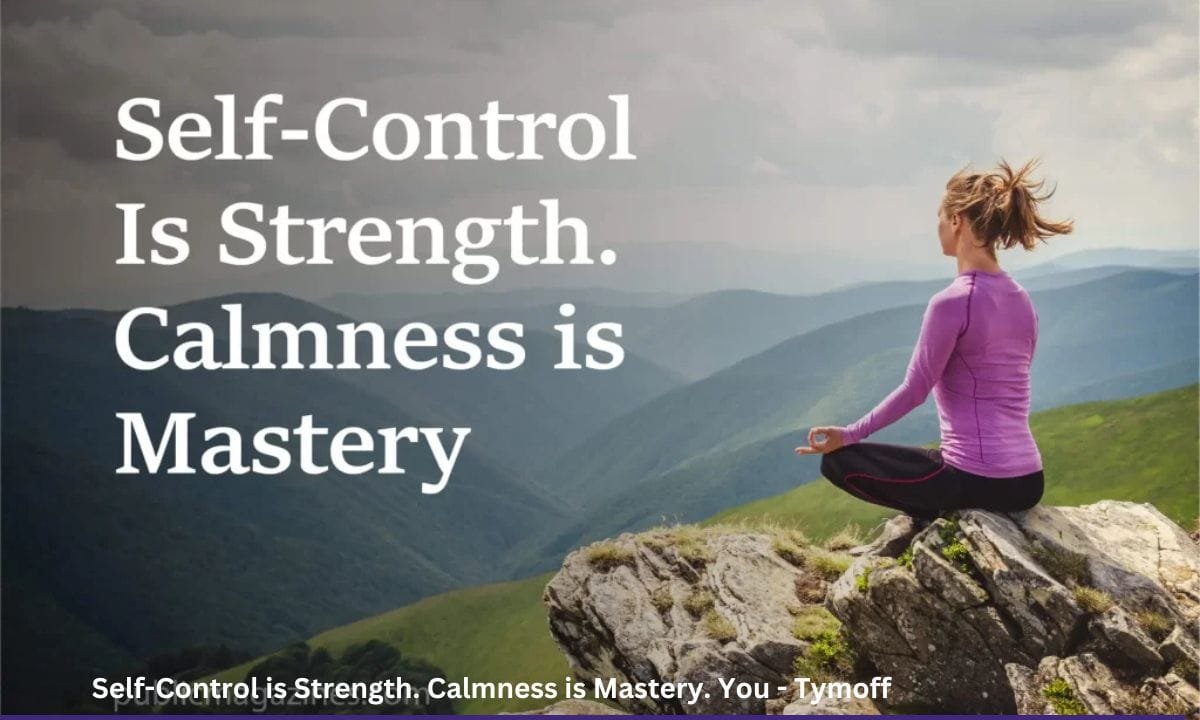Self-Control is Strength. Calmness is Mastery. You – Tymoff, In a world filled with distractions, stress, and constant challenges, the ability to maintain self-control and calmness is a true mark of strength and mastery. The quote, “Self-control is strength. Calmness is mastery. You – Tymoff,” encapsulates the essence of emotional intelligence and personal growth. This article will explore the importance of self-control and calmness, how they contribute to personal success, and practical ways to cultivate these traits in your daily life.
Why Self-Control is Strength. Calmness is Mastery. You – Tymoff
Self-control is the ability to regulate your emotions, thoughts, and behaviors in the face of temptations and impulses. It is a cornerstone of emotional intelligence and a key factor in achieving long-term goals.
Benefits of Self-Control
- Improved Decision-Making: Self-control helps you make rational decisions rather than impulsive ones.
- Better Relationships: It allows you to respond thoughtfully rather than react emotionally.
- Increased Productivity: By staying focused, you can accomplish more in less time.
- Enhanced Health: Self-control contributes to healthier habits, such as eating well and exercising regularly.
How to Develop Self-Control
- Set Clear Goals: Define what you want to achieve and why it matters.
- Practice Delayed Gratification: Train yourself to wait for rewards.
- Avoid Temptations: Remove distractions that hinder your progress.
- Monitor Your Progress: Keep track of your habits and behaviors.
Read Also: Thejavasea.me / Insanony IG / Ema AI 25M
Why Calmness is Mastery

Calmness is the ability to remain composed and peaceful, even in stressful situations. It reflects emotional maturity and mastery over one’s mind.
Benefits of Calmness
- Reduced Stress: Calmness lowers cortisol levels, promoting mental and physical well-being.
- Improved Focus: A calm mind can concentrate better on tasks.
- Better Problem-Solving: Calmness allows you to think clearly and find effective solutions.
- Stronger Relationships: Calm individuals are more approachable and empathetic.
How to Cultivate Calmness
- Practice Mindfulness: Engage in meditation or deep breathing exercises.
- Stay Present: Focus on the current moment rather than worrying about the future.
- Limit Stimulants: Reduce caffeine and sugar intake to avoid hyperactivity.
- Create a Peaceful Environment: Surround yourself with calming elements like soft music or nature sounds.
The Connection Between Self-Control is Strength. Calmness is Mastery. You – Tymoff

Self-control and calmness are interconnected. Self-control helps you manage your reactions, while calmness ensures that your responses are thoughtful and measured. Together, they create a balanced and resilient mindset.
Read Also: Role of a Versicherungsmakler / ERR ADDRESS UNREACHABLE
Table: Self-Control vs. Calmness
| Aspect | Self-Control | Calmness |
|---|---|---|
| Definition | Regulating emotions and behaviors | Maintaining composure in all situations |
| Key Benefit | Improved decision-making | Reduced stress and anxiety |
| How to Develop | Practice delayed gratification | Engage in mindfulness practices |
| Outcome | Long-term success and discipline | Emotional mastery and inner peace |
Practical Steps to Strengthen Self-Control and Calmness
1. Start Your Day with Intention
- Set a positive tone for the day by planning your tasks and focusing on your goals.
2. Practice Gratitude
- Reflect on what you’re thankful for to shift your mindset toward positivity.
3. Exercise Regularly
- Physical activity reduces stress and improves mental clarity.
4. Limit Screen Time
- Reduce exposure to negative news or social media to maintain a calm mind.
5. Seek Support
- Surround yourself with people who encourage and inspire you.
FAQs on Self-Control is Strength. Calmness is Mastery. You – Tymoff
1. What does “Self-control is strength. Calmness is mastery. You – Tymoff” mean?
This quote emphasizes that self-control is a sign of inner strength, while calmness reflects mastery over one’s emotions. It encourages individuals to take responsibility for their actions and mindset.
2. How can I improve my self-control?
You can improve self-control by setting clear goals, practicing delayed gratification, avoiding temptations, and monitoring your progress.
3. Why is calmness important in daily life?
Calmness reduces stress, improves focus, enhances problem-solving abilities, and strengthens relationships.
4. Can self-control and calmness be learned?
Yes, both self-control and calmness can be developed through consistent practice, mindfulness, and intentional habits.
5. How do self-control and calmness contribute to success?
They help you make better decisions, stay focused, manage stress, and build stronger relationships, all of which are essential for personal and professional success.
Conclusion
“Self-control is strength. Calmness is mastery. You – Tymoff” is more than just a quote; it’s a roadmap to personal growth and emotional intelligence. By cultivating self-control and calmness, you can navigate life’s challenges with grace and resilience. Start small, practice consistently, and watch as these traits transform your life.
Remember, the journey to self-mastery begins with you. Take the first step today



